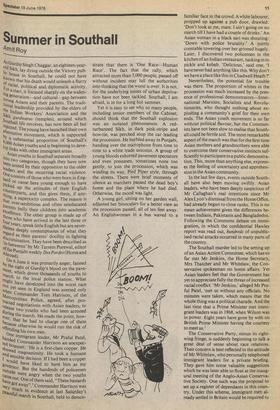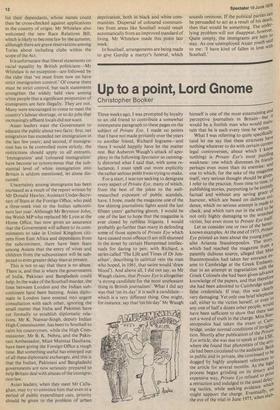Summer in Southall
Amit Roy As Gurdip Singh Chaggar, an eighteen-yearOld Sikh, lay dying outside the Victory public house in Southall, he could not have known that his death would unleash a flurry of racial, political and diplomatic activity. !or a start, it focused sharply on the widening generation —and cultural—gap between Y.°1-ing Asians and their parents. The traditional leadership provided by the elders of the Indian Workers' Association and the Southall gurdwaras (temples), around which 'outhall life revolves, has now been all but rejected. The young have launched their own alternative movement, which is supported by a substantial proportion of Southall 's ,°130 Asian youths and is beginning to deve lop links with other immigrant areas. , Asian youths in Southall separate broadly Into two categories, though they have now been united by their opposition to the older leaders and the recurring racial violence. ,011e consists of those who were born in England or came here young enough to have Picked up the attitudes of their English e opnterparts, and this gives them, if anything, a superiority complex. The reason is that over-ambitious and often uneducated Parents bully their children into academic excellence. The other group is made up of t2-lose who have arrived in the last three or ,lo,111" Years, speak little English but are nevertheless deeply contemptuous of what they regard as their parents' docility in fighting ,chscrimination. They have been described as in-betweens by Mr Tarsem Purewal, editor Of the Punjabi weekly Des Pardes (Home and Abroad).
On 6 June it was primarily anger, fanned
by the sight of Gurdip's blood on the pavernent, which drove thousands of youths to march to the local police station. What tn. Ight have developed into the worst race riot Yet seen in England was averted only When Commander Tom Harrison, of the !vletropolitan Police, agreed, after protracted negotiations with Asian leaders, to release two youths who had been arrested during the march. He made the point, however, that he had to charge one of them because otherwise he would run the risk of °ffending his own men.
, handed immigrant leader, Mr Praful Patel, Commander Harrison an unexpec
ted bouquet : 'He is a first-class copper. He 'flowed magnanimity. He took a humane ,,and sensible decision. If I had been a copper I Would have liked to have him as my governor. But the hundreds of policemen outside were angry when the two youths c alite out. One of them said, "These bastards have got away": Commander Harrison was very much in evidence at last Saturday's Peaceful march in Southall, held to demon
strate that there is 'One Race—Human Race'. The fact that the rally, which attracted more than 5,000 people, passed off without incident may lull the authorities into thinking that the worst is over. It is not, for the underlying issues of urban deprivation have not been tackled. Southall, I am afraid, is in for a long hot summer.
Yet it is easy to see why so many people, including senior members of the Cabinet, should think that the Southall explosion was an isolated phenomenon. A redturbanned Sikh, in dark pink-stripe and bow-tie, was perched atop the car leading the procession. He burbled away in Punjabi, handing over the microphone from time to time to a white trade unionist. A group of young bloods exhorted pavement spectators and even pressmen, sometimes none too gently, to join the procession, which was winding its way, Pied Piper style, through the streets. There were brief moments of . silence as marchers passed the dead boy's home and the place where he had died. Otherwise, the mood was light.
A young girl, sitting on her garden wall, adjusted her binoculars for a better view as the procession passed, all of ten feet away. An Englishwoman in a bus waved to a familiar face in the crowd. A white labourer, propped up against a pub door, drawled : 'Don't look at me, mate. I ain't going on no march till I have had a couple of drinks.' An Asian woman in a black sari was shouting: 'Down with police brutality.' A portly constable towering over her grinned hugely. Later, I discovered two policemen in the kitchen of an Indian restaurant, tucking in to pickle and kebab. 'Delicious,' said one, 'I have never had anything like this. Why don't we have a place like this in Chadwell Heath ?'
Nevertheless, the potential for trouble was there. The proportion of whites in the procession was much increased by the pres ence of professional demonstrators—International Marxists, Socialists and Revolu tionaries, who thought nothing about ex ploiting a community's grief for their own ends. The Asian youth movement is so far without political flavour, but the Communists have not been slow to realise that Southall could be fertile soil. The most remarkable aspect of the march was that for the first time Asian mothers and grandmothers were able to overcome their conservative instincts sufficiently to participate in a public demonstration. This, more than anything else, expresses the feeling of uncertainty and apprehension in the Asian community.
In the last few days, events outside Southall have also been moving swiftly. Asian leaders, who have been deeply suspicious of Mr Callaghan's real intentions since Mr Alex Lyon's dismissal from the Home Office, had already begun to close ranks. This is no mean achievement given the differences between Indians, Pakistanis and Bangladeshis. Following the Commons debate on immigration, in which the confidential Hawley report was read out, hundreds of unpublicised racial attacks occurred in many parts of the country.
The Southall murder led to the setting up of an Asian Action Committee, which has so far met Mr Jenkins, the Home Secretary, Mrs Thatcher and Mr Whitelaw, the Conservative spokesman on home affairs. Yet Asian leaders feel that the Government has yet to appreciate fully the threat of increased racial conflict. 'Mr Jenkins,' alleged Mr Praful Patel, 'met us without any officials. No minutes were taken, which means that the whole thing was a political charade. And the last time that a Prime Minister met immigrant leaders was in 1968, when Wilson was in power. Eight years have gone by with no British Prime Minister having the courtesy to meet us.'
The Conservative Party, minus its rightwing fringe, is suddenly beginning to talk a great deal of sense about race relations. Their concern is best reflected in the attitude of Mr Whitelaw, who personally telephoned immigrant leaders for a private briefing. They gave him some valuable suggestions which he was later able to float at the inaugural meeting of the Anglo-Asian Conservative Society. One such was the proposal to set up a register of dependants in this country. Under this scheme, immigrant men already settled in Britain would be required to list their dependants, whose names could then be cross-checked against applications in the country of origin. Mr Whitelaw also welcomed the new Race Relations Bill, which is likely to become law by the autumn, although there are grave reservations among Tories about including clubs within the scope of the Act.
It is unfortunate that liberal statements on racial equality by British politicians—Mr Whitelaw is no exception—are followed by the rider that 'we must from now on have strict immigration control.' Of course there must be strict control, but such statements strengthen the widely held view among white people that a significant proportion of immigrants are here illegally. They are not. Many were encouraged to come to meet the country's labour shortage, or to do jobs that increasingly affluent locals did not want.
Asian leaders want the Government to educate the public about two facts: first, net emigration has exceeded net immigration in the last few years: and second, if immigration has to be controlled more strictly, the restrictions should apply to all entrants. 'Immigration' and 'coloured immigration' have become so synonymous that the substantial level of white immigration into Britain is seldom mentioned, let alone discussed.
Uncertainty among immigrants has been increased as a result of the report written by Mr Donald Hawley, Assistant Under-Secretary of State at the Foreign Office, who paid a three-week visit to the Indian subcontinent last year. Although Mr Brynmor John, the Welsh MP who replaced Mr Lyon at the Home Office, has now given an assurance that the Government will adhere to its commitments to take in United Kingdom citizens from East Africa and dependants from the subcontinent, there have been fears among Asians that the entry of wives and children from the subcontinent will be subjected to even greater delay than at present.
This is not to say that there is no abuse. There is, and that is where the governments of India, Pakistan and Bangladesh could help. In the wake of the Southall murder, the lines between London and the Indian subcontinent have been buzzing. Asian diplomats in London have entered into urgent consultation with each other, ignoring the small matter that India and Pakistan have yet formally to establish diplomatic relations. Mr K. Natwar-Singh, deputy Indian High Commissioner, has been to Southall to calm his countrymen, while the High Commissioner, Mr B. K. Nehru, and the Pakis tani Ambassador, Mian Mumtaz Daultana, have been giving the Foreign Office a rough time. But something useful has emerged out of all these diplomatic exchanges, and this is that the Indian, Pakistani and Bangladeshi governments are now seriously prepared to help Britain deal with abuses of the immigration law.
Asian leaders, when they meet Mr Callaghan, may try to convince him that even in a period of public expenditure cuts, priority should be given to the problem of urban deprivation, both in black and white communities. Dispersal of coloured communities from areas like Southall would result automatically from an improved standard of living. Mr Whitelaw made this point last week.
In Southall, arrangements are being made to give Gurdip a martyr's funeral, which
sounds ominous. If the political parties can be persuaded to act as a result of his death, then that would be something. The underlying problem will not disappear, however. Quite simply, the immigrants are here 1° stay. As one unemployed Asian youth said to me: 'I have kind of fallen in love with Southall.'



































 Previous page
Previous page